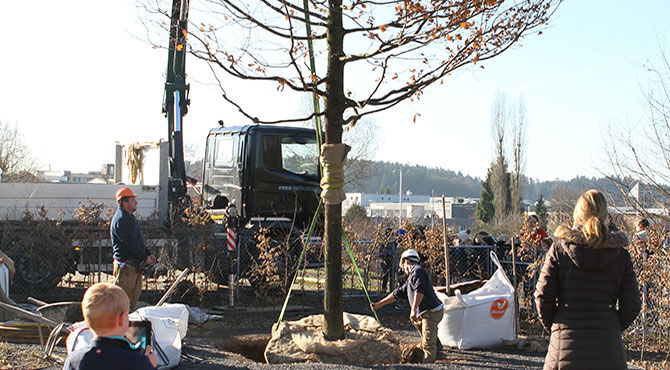Extending learning with school research gardens
School research gardens help children acquire skills that will benefit them throughout their lives. Inter-Community School Zurich explains how their garden has expanded learning opportunities.

Educational and social benefits
The research garden was created as a space for investigation, inquiry and connection. It is an extension of ICS’s outdoor learning spaces – a unique classroom and a controlled environment in which the school community can interact with the natural world. The garden provides opportunities beyond the traditional classroom and broadens children’s experience of eco-complexity.Studies have demonstrated that school research gardens have numerous educational and social benefits. The most obvious initial benefit lies in the increased interaction with the environment they offer students. Numerous activities can be organised to heighten students’ awareness of the impact of their environmental footprint in the school community, as well as in other larger contexts.The benefits of a research garden
Children who live in urban environments may not experience the complexity of natural ecosystems. Research gardens can provide them with this vital opportunity. Through working in the natural space, they develop a sense of the complex interdependency of all the elements in the garden – plants, vegetables, insects, soil, water, sun, and so on.Research gardens provide a site for regular access, so children can experience this complexity at first hand and create a bond with the place itself. As part of this, children also experience the fundamental changes the natural environment regularly undergoes over the course of a year.Research gardens also provide an opportunity for the development of knowledge and understanding of the environmental sciences, and science thinking more generally. Gardens provide learning opportunities for data-gathering and interpretation, measuring space, observing and experimenting with natural and plant processes, learning about soil improvement, recycling, growth and decay, and so on. The garden facilitates cognitive development through exercising the child’s capacities for observation, analysis and hypothesis.Related articles:
- Choosing a new school for a successful relocation
- Relocate’s International education guide: new edition coming soon
- Promoting the wellbeing of globally mobile employees
You and the environment
Learning in a school garden can also work to develop a greater sense of environmental responsibility. Gardening is about human interaction with the environment and the impacts, positive and negative, which that interaction can have. Research has demonstrated that adults who have had significant and positive exposure to nature as children view nature in positive and meaningful ways and are more likely to be environmentally sensitive and active.This ethical imperative is central to the concept of the research garden at ICS. One of its aims is to provide a space to teach environmental responsibility both directly and indirectly, through teaching children to experience and value the natural world, and by working on concepts of preservation and sustainability.The ICS research garden
The research garden at ICS is also designed with a sensory element: the school has sought to create a space that works on the senses, incorporating smell, touch and taste alongside sight and sound. For example, the choice of plants has been made with the intention of providing different textures and smells. Some plants will also be edible, and the garden overall is created with its broad aesthetic properties in mind. In addition, the garden will have a space for contemplation and reflection.The garden has been supported by an enthusiastic group of teachers, who have a high level of understanding of how to use and tend it. This group has been sharing resources with colleagues and working on learning objectives for units that incorporate the use of the garden.The ICS research garden provides a vast range of learning opportunities for its diverse community. The benefits are many: research has shown that gardens can have a positive impact on academic achievement and student behaviour, promoting teamwork and collaboration as well as increased student motivation and enthusiasm, for instance.Importantly, ICS’s research garden allows for learning that is inquiry-based and interdisciplinary. Students will be engaged at multiple levels – intellectual, sensory, social and emotional. At the same time, it provides a powerful set of ethical lessons about caring for, and taking responsibility for, the environment.The Inter-Community School Zurich (ICS) is the longest-established international school in the Zurich area. A private coeducational day school established in 1960, it provides a world-class international education for students aged from 3 to 18. It welcomes applications from prospective students throughout the year. Contact admissions@icsz.ch if you have questions or would like to visit the school’s campus.
For related news and features, visit our Education & Schools section.Access hundreds of global services and suppliers in our Online Directory Get access to our free Global Mobility Toolkit
Get access to our free Global Mobility Toolkit  © 2017. This article first appeared in the Spring 2017 edition of Relocate magazine, published by Profile Locations, Spray Hill, Hastings Road, Lamberhurst, Kent TN3 8JB. All rights reserved. This publication (or any part thereof) may not be reproduced in any form without the prior written permission of Profile Locations. Profile Locations accepts no liability for the accuracy of the contents or any opinions expressed herein.
© 2017. This article first appeared in the Spring 2017 edition of Relocate magazine, published by Profile Locations, Spray Hill, Hastings Road, Lamberhurst, Kent TN3 8JB. All rights reserved. This publication (or any part thereof) may not be reproduced in any form without the prior written permission of Profile Locations. Profile Locations accepts no liability for the accuracy of the contents or any opinions expressed herein.

































